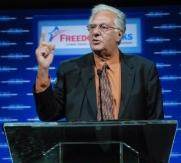The third in a series about Dick Armey and his relationship to the tobacco industry throughout his career. See part one and part two.
In his last job as head of Freedomworks, Dick Armey became a more consistent and reliable ally for the tobacco industry for at least one of their pet issues: cigarette taxes.
Under Armey, FreedomWorks consistently took the tobacco industry’s side by opposing cigarette tax increases. In 2005, FreedomWorks opposed a cigarette tax increase in Cook County, Illinois. In 2006, Armey and FreedomWorks opposed a cigarette tax increase in Hawaii. In 2007, FreedomWorks boasted about the effectiveness of a $12 million ad blitz by the tobacco companies aimed at killing a cigarette tax proposal in Oregon. In 2009, Armey spoke against cigarette taxes and FreedomWorks took positions opposing higher cigarette taxes. Armey also opposed a cigarette tax increase in Maine in 2011. In the meantime, Armey also continued using FreedomWorks to promote his flat-tax idea.
Applicants later discovered they had been unwittingly tricked into becoming members of Citizens for a Sound Economy to get the low group rate they had been promised. Their insurance certificates failed to disclose the name of CSE, the group to which the application form was linked.
The forced-membership scheme netted CSE/FreedomWorks about 16,000 new members and over $638,000, but led to a class-action lawsuit against the insurance company by people who were tricked into joining CSE as part of their insurance policy application process.
The Wall Street Journal described AngryRenter.com as looking “a bit like a digital ransom note, with irregular fonts, exclamation points and big red arrows.”
The site claimed to represent legions of angry renters who were driven to vent their outrage at a proposed government bailout of irresponsible homeowners. The site claimed to represent “millions of renters standing up for our rights!” and visitors were led to sign an anti-bailout petition. According to the Wall Street Journal, the site was “designed to look underdoggy and grass-rootsy, with a heavy dose of aw-shucks innocence.”
What AngryRenter.com failed to disclose was that it was created not by an actual group of “angry renters,” but by wealthy publishing mogul Steve Forbes, who worked through FreedomWorks to create it. FreedomWorks put its copyright on the site, but buried it deep on the back pages.
The Wall Street Journal (WSJ) pointed out that while Armey was portraying himself as a representative of the tenant class, as of May, 2008 he “earned $100,833 a year for four hours a week working for FreedomWorks Inc., the organization’s advocacy arm, and an additional $403,333 for 32 hours a week working for FreedomWorks Foundation, its tax-deductible, educational wing, according to federal tax filings. Mr. Armey also owns a house on 78.5 acres in Denton County, Texas, north of Dallas. In response to a public-information request, local authorities revealed that the land and house are worth a combined $1.7 million.”
WSJ also pointed out that Forbes, the chairman and CEO of Forbes and a FreedomWorks board member, owned a 7,966 square foot house on 9.5 acres in New Jersey, assessed at $2.78 million, and at least a half a dozen other properties nearby, and that Forbes also owned a chateau in France.
Beyond that, at that time in 2006, Freedomworks and its affiliated foundation had taken in $10.5 million worth of revenue, much of it from large donors that FreedomWorks refused to disclose. In 2009, Armey defended himself against accusations that AngryRenter.com was a front by saying he was just looking out for the “poor devil” who couldn’t afford to buy a house.
Beyond Yard Signs
But in October 2012, the group accepted a $5.7 million donation from a single, mysterious donor, a Knoxville, Tennessee company that proved difficult to trace. It then used some of the money to purchase $1.5 million worth of TV ads attacking Tammy Duckworth, an Iraq war veteran who was running as a Democrat for an Illinois House seat.
Freedomworks announced it intended to make even more big TV ad buys in other races, too. It was also later revealed that FreedomWorks had paid Glenn Beck $1 million and Rush Limbaugh over $400,000 to say nice things about FreedomWorks on their radio talk shows, ostensibly as a way to help the group raise more money. Neither Beck nor Limbaugh raised nearly enough to compensate FreedomWorks for the massive amounts it had funneled to them for their support.
It was later revealed that Armey was offered an $8 million “consulting” deal ($400,000 a year for the next 20 years) to leave the organization. The donor who supplied the $8 million was Richard J. Stephenson, a FreedomWorks board member and founder of Cancer Treatment Centers of America, who had been an ally of FreedomWorks president – and Armey’s rival – tea partier Matt Kibbe, who had quietly been battling Armey for control of FreedomWorks.
But in a tell-all interview with Media Matters after he split with FreedomWorks, Armey told how he had become increasingly alienated from the group. According to Armey, FreedomWorks president Matt Kibbe had conducted activities behind Armey’s back and had started withholding key information from him about the group and its operations, including information about the payments made to Beck and Limbaugh for promoting FreedomWorks on the radio.
Apparently Armey has signed no confidentiality agreement preventing him from talking about FreedomWorks and how he felt it had taken a wrong direction, as Armey continues to talk to the media about his split from the organization and how he feels FreedomWorks has taken a wrong turn.
Stay tuned.
Subscribe to our newsletter
Stay up to date with DeSmog news and alerts






